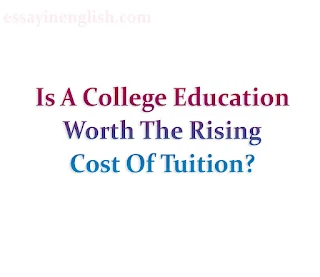This is argumentative essay/writing on the topic - "Is a college education worth the rising cost of tuition?"
In today's society, higher education is frequently celebrated as a key to success, offering avenues for personal growth, professional advancement, and economic security. However, the ever-increasing cost of college tuition has sparked a heated debate over whether the advantages of earning a college degree are worth the significant financial strain placed on students and their families.
Supporters of higher education argue that it remains a valuable investment with long-term benefits, while critics assert that the skyrocketing tuition costs have become unsustainable, deepening inequalities and reducing the accessibility of higher education. This essay explores both sides of this debate, examining the complexities of the issue and ultimately assessing whether the value of a college education justifies its rising price.
The Benefits of a College Education
Firstly, it is crucial to recognize the numerous benefits associated with earning a college degree. Beyond the specialized knowledge and skills gained, college education nurtures critical thinking, problem-solving capabilities, and intellectual curiosity. Additionally, multiple studies consistently show a strong link between higher education levels and increased earning potential.
According to data from the U.S. Bureau of Labor Statistics, individuals with a bachelor's degree earn significantly higher median weekly wages compared to those with only a high school diploma. Furthermore, a college degree frequently opens doors to a broader range of career opportunities, enabling individuals to pursue professions that align with their passions and interests.
Moreover, the non-financial benefits of a college education extend beyond economic gains. Higher education levels are linked to greater job satisfaction, better health outcomes, and increased social mobility. Additionally, college graduates are more likely to engage in civic activities, contribute to their communities, and lead fulfilling lives. Therefore, advocates argue that the holistic benefits of earning a college degree outweigh the initial costs, positioning higher education as a transformative experience that empowers individuals to achieve their full potential.
The Escalating Cost of College Tuition
However, the soaring cost of college tuition has become a significant obstacle for many prospective students, threatening to erode the accessibility and affordability of higher education. Over the past few decades, college tuition has grown at a rate that far exceeds inflation, placing a heavy financial burden on students and their families.
Data from the College Board indicates that the average cost of tuition and fees at public four-year institutions has more than tripled since the late 1980s, while tuition at private nonprofit institutions has nearly doubled. Consequently, students increasingly resort to taking on substantial student loan debt, which can take years, if not decades, to repay.
Additionally, the rising cost of college tuition disproportionately impacts marginalized communities, exacerbating existing disparities in access to higher education. Low-income students, in particular, face significant barriers to attending college due to financial constraints. As tuition costs continue to rise, many capable and deserving individuals are deterred from pursuing higher education, perpetuating cycles of poverty and limiting social mobility. Furthermore, the student debt crisis has reached alarming proportions, with total student loan debt in the United States surpassing $1.7 trillion. This mounting debt not only restricts individual financial freedom but also poses broader economic risks.
Is College Still Worth It?
Given these challenges, the question arises: Is a college education still worth the rising cost of tuition? Proponents argue that while the current system may be flawed, the inherent value of higher education remains intact. They contend that investing in a college degree is an investment in one's future, offering personal and professional growth opportunities that extend far beyond financial returns. Additionally, advocates call for policy reforms aimed at addressing the root causes of rising tuition costs, such as increased state funding for public universities, greater transparency in college pricing, and expanded financial aid programs.
On the other hand, critics argue that the traditional model of higher education requires significant restructuring to remain relevant and affordable in the 21st century. They claim that the emphasis on four-year degrees may not align with the needs of today's rapidly evolving job market, which increasingly demands technical skills and vocational training. Moreover, critics argue that the commodification of education has led to inflated tuition costs and a proliferation of administrative bloat within universities, diverting resources away from core educational functions.
Conclusion
In conclusion, the debate over the value of a college education in the context of rising tuition costs is complex and multifaceted. While the benefits of earning a college degree are undeniable, the escalating cost of tuition presents significant challenges to the accessibility, affordability, and equity of higher education.
Ultimately, the worth of a college education must be assessed on a case-by-case basis, considering individual circumstances, career goals, and financial realities. However, it is essential that policymakers, educators, and stakeholders work together to address the systemic issues underlying the affordability crisis and ensure that higher education remains a pathway to opportunity for all aspiring students, regardless of socioeconomic background.
Only through collective efforts to control costs, expand access, and promote innovation can we uphold the transformative promise of higher education in society.







0 Comments